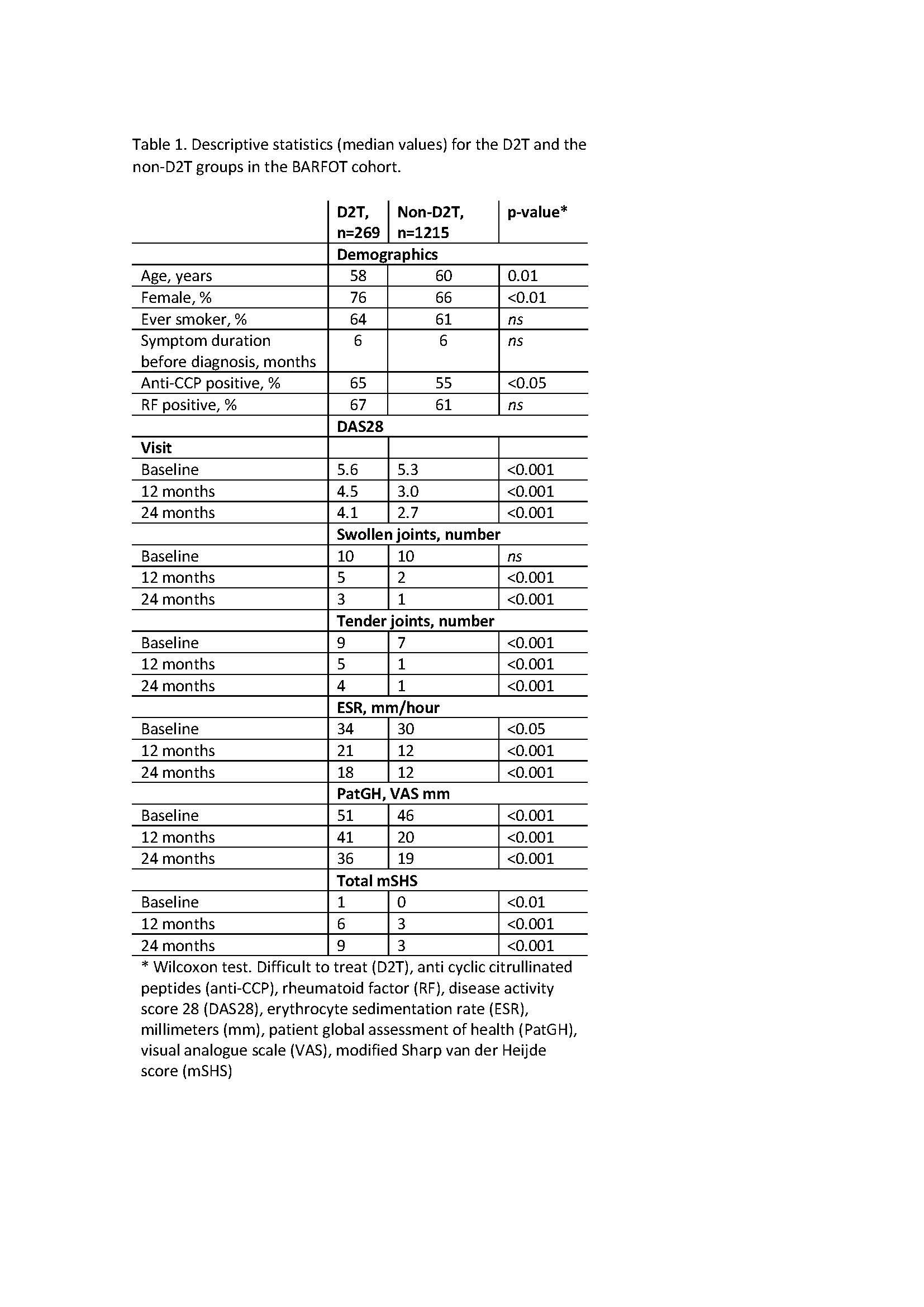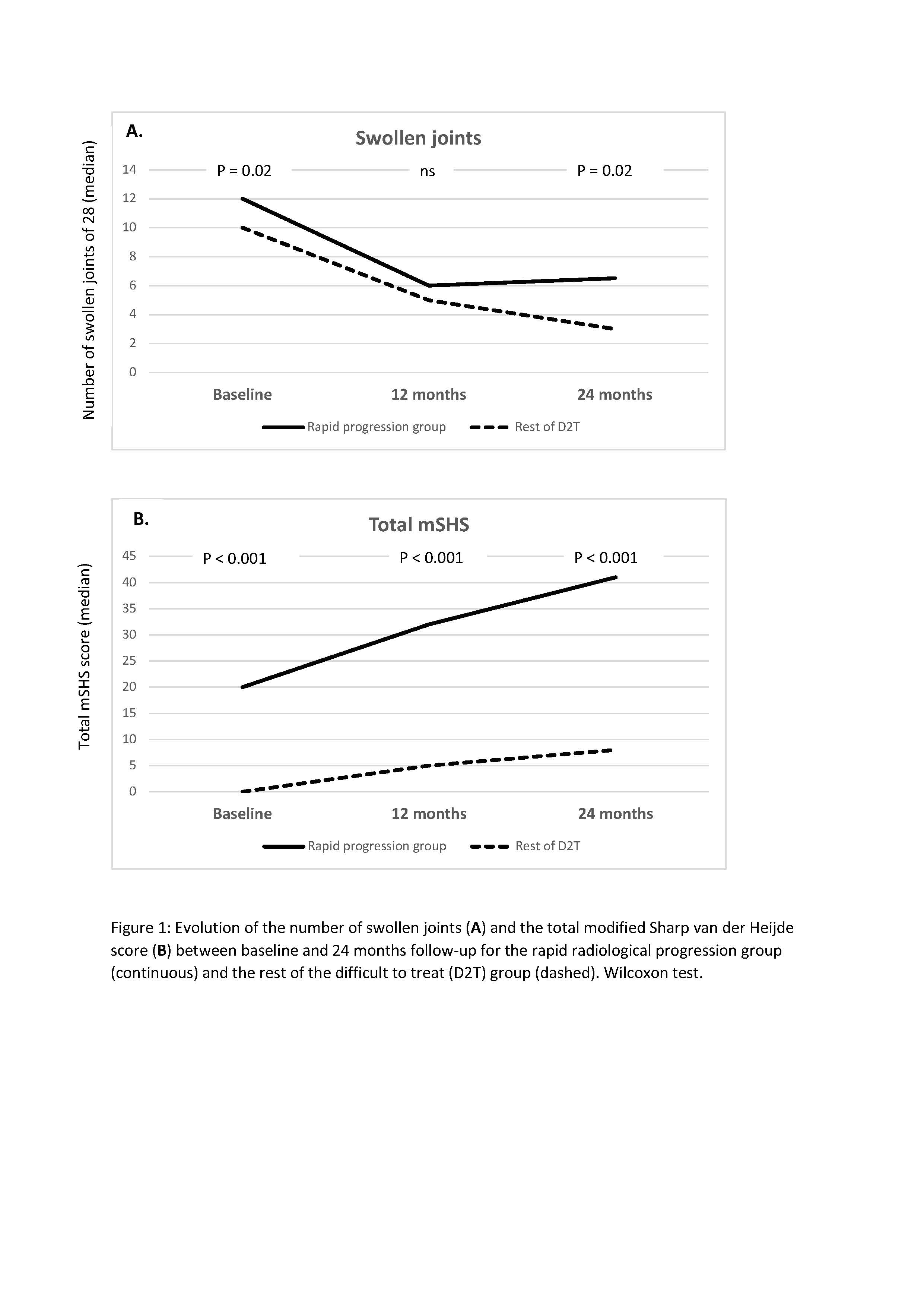Session Information
Session Type: Abstract Session
Session Time: 3:00PM-4:30PM
Background/Purpose: Although treatment of rheumatoid arthritis (RA) has improved there is still a significant number of patients who never reach low disease activity, known as difficult-to-treat (D2T) RA. D2T RA includes not only uncontrolled inflammatory disease, but also factors such as chronic pain, comorbidities and treatment-limiting adverse events. Here, we study if autoantibodies to peptides from joint-related proteins (JointIDs), known to influence arthritis development in animal models and on RA outcome in patients, can predict D2T patients with severe disease at 24 months follow-up (FU).
Methods: Early untreated RA patients (n=1484) from the Swedish BARFOT cohort were analysed for JointIDs using a bead-based flow immunoassay (Lonnblom et al., A&R 2023). Patients were classified as D2T based on adapted EULAR recommendations (Nagy et al., ARD 2022), and included if they fulfilled the following criteria: DAS28 > 3.2 at 12 and 24 months, or radiographic progression ≥5 units according to modified Sharp van der Heijde score (mSHS) at 12 or 24 months compared to baseline, or Patient’s Global Health, VAS > 40 at 12 and 24 months, or glucocorticosteroid dose ≥7. 5 mg daily at 12 and 24 months, and > 2 changes in disease-modifying anti-rheumatic drugs (DMARDs) between baseline and 24 months
Results: N=269 patients were classified as D2T. Compared to the non-D2T group (n=1215), a higher proportion of D2T patients were female, younger, and positive for anti-CCP (Table 1). Also, they had higher DAS28, erythrocyte sedimentation rate and more tender but not swollen joints at diagnosis. Throughout the FU, the D2T patients had more inflammation and radiographic destruction. All D2T patients changed DMARD 2 to 4 times between baseline and 24 months, while only 21% of non-D2T patients had ≥2 changes.
Using hierarchical cluster analysis, we identified a subgroup of D2T patients (n=19) characterized by rapid joint destruction and more swollen joints (Figure 1), but not more tender joints. In a multivariate logistic analysis, a higher total mSHS at baseline (OR 1.6 for 5 units increase, p< 0.001) as well as positivity for the non-citrullinated peptide JointID-111 (OR 4.6, p=0.02), and the citrullinated peptide JointID-166 (OR 3.3, p< 0.05) were strongly predictive of being in the D2T subgroup at 24 months, with AUROC (Area Under the Receiver Operating Characteristic curve) 92%. Positive for anti-CCP or rheumatoid factor did not change the model.
Conclusion: We have identified a subset of D2T patients characterized by rapid radiographic progression, identified at diagnosis by two distinct JointIDs and radiographic joint destruction. Our results suggest that the deciphering specific immune responses in RA patients paves the way for precision medicine.
To cite this abstract in AMA style:
Gjertsson I, Leu Agelii M, Sareila O, Lönnblom E, Jacobsson L, Cheng L, Forslind K, Hafström I, Andersson M, Holmdahl R. Autoantibodies to Joint-related Proteins Predict Severe Joint Destruction in Difficult-to-treat Rheumatoid Arthritis Patients [abstract]. Arthritis Rheumatol. 2024; 76 (suppl 9). https://acrabstracts.org/abstract/autoantibodies-to-joint-related-proteins-predict-severe-joint-destruction-in-difficult-to-treat-rheumatoid-arthritis-patients/. Accessed .« Back to ACR Convergence 2024
ACR Meeting Abstracts - https://acrabstracts.org/abstract/autoantibodies-to-joint-related-proteins-predict-severe-joint-destruction-in-difficult-to-treat-rheumatoid-arthritis-patients/


